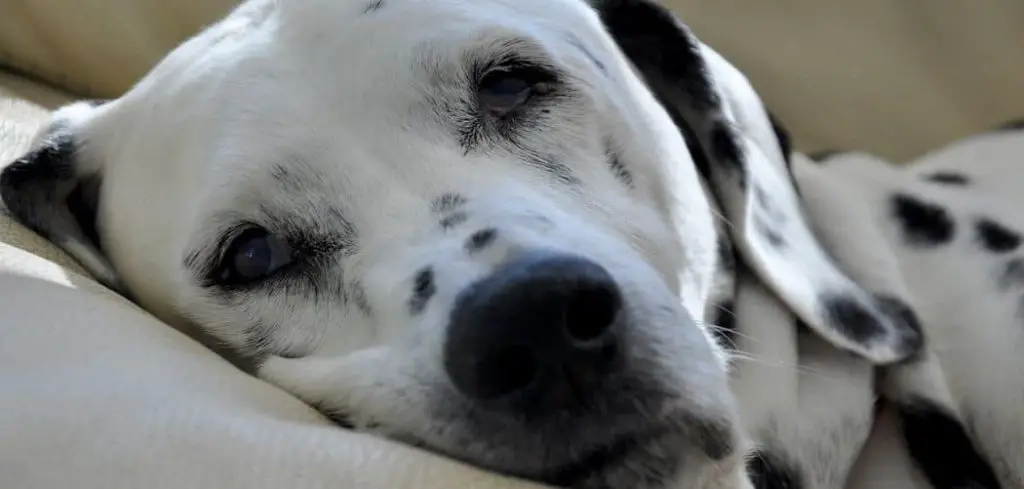Dogs use licking as a natural behavior, but when it becomes excessive and is paired with gagging, it often points to an underlying health concern.
This combination can be distressing to witness and may signal issues ranging from allergies to gastrointestinal or respiratory problems.
We outline the common reasons why a dog may excessively lick and gag, what you can do at home, and when to seek veterinary help.
Dog Excessively Licking and Gagging — Why It Happens
Excessive licking and gagging in dogs can arise from a mix of physical discomfort and medical issues. Dogs may lick repeatedly due to nausea, allergies, dental pain, or stress, while gagging often points to throat irritation, foreign bodies, or respiratory problems.
Sometimes the two symptoms are linked—for instance, nausea may cause a dog to lick surfaces or lips before gagging.
Because the causes range from mild to serious, it’s important to understand what could be happening.

Dog Excessively Licking and Gagging: Common Causes
Nausea and Gastrointestinal Upset
When a dog feels nauseated, it may begin licking its lips, floors, or other surfaces excessively. This behavior is often followed by gagging or retching as the stomach becomes unsettled.
Owners may notice drooling, loss of appetite, or vomiting in addition to licking and gagging. Causes of nausea can include dietary indiscretion, infections, or pancreatitis. While mild nausea may resolve, persistent or severe cases require veterinary evaluation.
Read more: Dog Excessively Licking and Panting (Why it may happen)
Allergies and Skin Irritation
Dogs with environmental or food allergies often lick excessively to relieve itching or discomfort. While the licking is usually focused on paws or skin, it can extend to lip-licking, which in turn triggers gagging if the throat is irritated.
Other signs may include red skin, ear infections, or chronic itching. If the gagging occurs alongside seasonal changes or after eating, allergies may be contributing to the problem.
Dental Disease and Oral Pain
Oral discomfort can cause a dog to lick frequently, especially around the lips and mouth. Dental infections, gum disease, or abscessed teeth may lead to excessive licking.
The irritation in the mouth or throat can also cause gagging, especially if bacteria or inflammation spreads. Dogs may also show bad breath, drooling, or reluctance to eat hard food. Dental disease should be taken seriously, as infections can spread to other organs.
Foreign Object in the Throat or Mouth
A stuck object such as a piece of bone, stick, or toy fragment can cause both excessive licking and gagging. The dog may lick repeatedly as a stress response and gag while attempting to clear the obstruction.
This situation is potentially dangerous. Owners may also notice pawing at the mouth, coughing, or distress. Foreign objects require immediate veterinary attention, as they can obstruct breathing or damage tissues.
Respiratory Irritation or Infection
Respiratory conditions such as kennel cough or throat inflammation may trigger a cycle of licking and gagging. The dog may lick its lips to soothe irritation while gagging when coughing fits occur.
Other signs include sneezing, nasal discharge, or lethargy. While some infections are mild, others may progress quickly, especially in puppies or senior dogs. Monitoring and early treatment are important.
Stress, Anxiety, or Behavioral Causes
Not all cases are physical. Some dogs lick excessively as a compulsive behavior linked to stress or anxiety. Over time, the repetitive licking may trigger gagging or throat irritation.
Signs of stress-related licking include pacing, whining, or destructive behavior. While behavioral causes may seem less urgent, chronic stress impacts a dog’s overall health and well-being.
What to Do If Your Dog Is Excessively Licking and Gagging
At home, owners can take steps to provide comfort and reduce risk. Ensure your dog has fresh water available at all times, as hydration supports recovery and soothes irritation.
Remove access to potentially harmful items that could be swallowed and cause gagging.
Monitor your dog’s diet and avoid sudden changes that may trigger nausea or food sensitivities.
If allergies are suspected, consider whether recent foods, treats, or environmental changes could be playing a role. Gentle cleaning of your dog’s mouth or paws may also help if debris or allergens are involved.
Provide a calm and quiet environment. Stress can worsen both licking and gagging, so reducing triggers such as loud noises or disruptions may help ease symptoms. Keep a close watch on whether symptoms improve within a day or persist.
When to Call or Visit Your Vet
Seek veterinary care right away if your dog is struggling to breathe, cannot stop gagging, or shows signs of choking. These may indicate an obstruction or serious throat irritation.
Contact a vet if licking and gagging are persistent, worsen over time, or are accompanied by vomiting, drooling, loss of appetite, or lethargy.
These signs may point to infections, dental disease, or gastrointestinal issues that require treatment.
Even if symptoms appear mild, it’s wise to check with your vet if they last longer than 24–48 hours. Early evaluation often prevents complications and helps your dog feel better faster.
Read more: Dog licking excessively (Discover what it might mean)
Key Takeaway
Excessive licking combined with gagging is often more than just a quirky habit—it may signal nausea, allergies, dental disease, or even an obstruction. While some causes are mild, others are urgent and need veterinary care.
Providing hydration, comfort, and monitoring are helpful first steps at home, but persistent or severe cases should never be ignored.
By acting early and seeking guidance when needed, owners can ensure their dogs get the relief and care they deserve.
